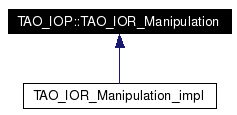
import "IOR.pidl";
Inheritance diagram for TAO_IOP::TAO_IOR_Manipulation:

Public Types | |
| typedef sequence< Object > | IORList |
Public Member Functions | |
| Object | merge_iors (in IORList iors) raises (EmptyProfileList,Duplicate,Invalid_IOR) |
| Object | add_profiles (in Object ior1, in Object ior2) raises (EmptyProfileList, Duplicate, Invalid_IOR) |
| Object | remove_profiles (in Object ior1, in Object ior2) raises (Invalid_IOR, EmptyProfileList, NotFound) |
| boolean | set_property (in TAO_IOR_Property prop, in Object ior) raises (Invalid_IOR, Duplicate) |
| boolean | set_primary (in TAO_IOR_Property prop, in Object ior1, in Object ior2) raises (Invalid_IOR, Duplicate, MultiProfileList, NotFound) |
| boolean | remove_primary_tag (in TAO_IOR_Property prop, in Object ior) |
| Object | get_primary (in TAO_IOR_Property prop, in Object ior) raises (NotFound) |
| boolean | is_primary_set (in TAO_IOR_Property prop, in Object ior) |
| unsigned long | is_in_ior (in Object ior1, in Object ior2) raises (NotFound) |
| Returns number of profiles which are in both ior1 and ior2. | |
| unsigned long | get_profile_count (in Object ior) raises (EmptyProfileList) |
Manipulating Object References. While this interface does not assume the use of CORBA complient IOPs, the IOP termonology is used throughout. Object references (Object) are used since they encapsulate the notion of object references and IORs. Note, an IOR contains one or more profiles and a profile can be considered to represent the location or route to a specific instance of an object. A profile may also contain supplimentary information useful for differrent services such as security. All Object references may have multiple profiles
Definition at line 120 of file IOR.pidl.
|
|
Definition at line 122 of file IOR.pidl. Referenced by TAO_IOR_Manipulation_impl::add_profiles(), and TAO_IOR_Manipulation_impl::merge_iors(). |
|
||||||||||||
|
copy the profile list from "ior2" to "ior1". Note on ordering, while the current implementation will place the profiles from ior2 (which are not already in ior1) on the end of the profile list in ior1, there is no guarantee this ordering will be maintained. For example, string_to_object or object_to_string may reorder the profile lists. So, if it is important to use one profile before another then policies should be used along with tagged components/tagged profiles. |
|
||||||||||||
|
Returns the ior of the primary from ior if it has been set. Else returns a NotFound exception |
|
|
This will return the number of profiles contained in the corresponding object reference for this object. |
|
||||||||||||
|
Returns number of profiles which are in both ior1 and ior2.
|
|
||||||||||||
|
Returns a true or false depending on whether a primary member has been set in ior |
|
|
Create a new object reference by merging the profiles lists in the supplied list of one or more object references. |
|
||||||||||||
|
If any of the IOR's within the IOGR has a primary tag, just remove it. Return zero if no primary found. |
|
||||||||||||
|
|
|
||||||||||||||||
|
|
|
||||||||||||
|
Allows setting of properties as defined by the prop object in the ior list |
 1.3.6
1.3.6